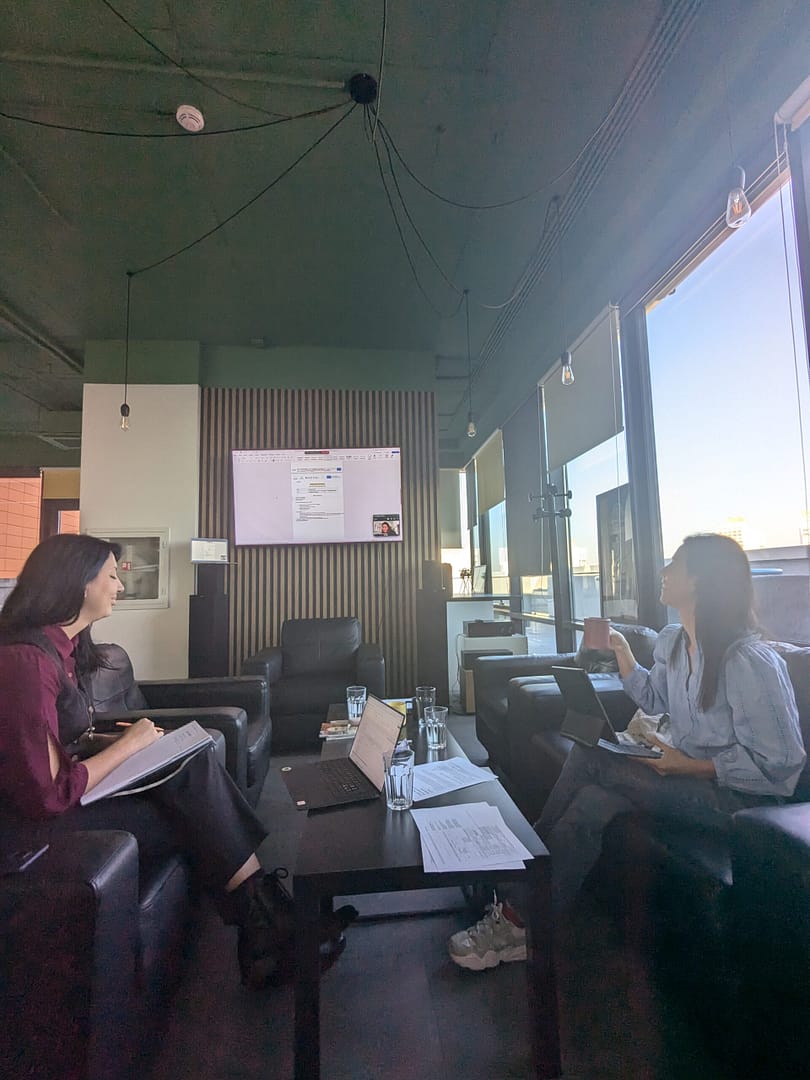Learning Outcomes:
By the end of the session, participants should have acquired solid knowledge about key attributes and responsibilities of a good mentor, effective communication and feedback skills for mentoring, techniques for building and maintaining a positive mentoring relationship;
Duration:
2 hours and 30 minutes
Materials needed:
Laptop or computer
Projector and screen
Whiteboard and markers
- PPT Presentation
Flip charts and markers
Post-it notes
Pens and notebooks for participants
Printed handouts on communication techniques and feedback
Evaluation forms for feedback
Preparation
- Prepare a PowerPoint presentation covering key aspects of mentoring methodology.
- Print handouts summarizing mentoring strategies and techniques.
- Arrange the room to facilitate group work and discussions. Create an inclusive environment: arrange the space to accommodate everyone, ensuring accessibility for individuals with disabilities and providing resources for people who do not speak/understand the language of the module fluently. Support adequately people with special needs with regards to guidance, time management, engagement etc. (e.g. parents, workers, individuals with learning difficulties, etc.).
- Gather all necessary materials (listed above).
- Prepare the aspects of role-play mentoring scenarios.
- Prepare a Kahoot learning game for participants to complete at the end of the session to evaluate their understanding of the topic of mentoring.
- Share the PowerPoint Presentation along with any additional resources with the participants.
Description
Introduction and icebreaker activity (15 minutes)
Briefly introduce the workshop objectives and schedule.
Emphasize the importance of mentoring in personal and professional development.
Icebreaker Activity: Participants form pairs and discuss their expectations and past experiences with mentoring, either as mentors or mentees.
Theoretical overview of communication and feedback techniques (20 minutes)
- Interactive Presentation on Key Attributes and Responsibilities (5 minutes)
- Discussion on Characteristics of a Good Mentor:
- Begin with a brainstorming session where participants list characteristics they believe make a good mentor.
- Use a virtual whiteboard or flipchart to capture responses. Discuss the listed characteristics and add any missing key attributes.
- Discussion on Characteristics of a Good Mentor:
- Explanation of Roles and Responsibilities of a Mentor in Different Contexts (10 minutes)
- Divide participants into small groups. Assign each group a different mentoring context (e.g., workplace, academic, personal development).
- Each group discusses and identifies the specific roles and responsibilities of a mentor in their assigned context. Groups then share their findings with the larger group.
- Interactive Session on Effective Communication and Feedback Techniques (5 minutes)
- The trainer demonstrates a brief scenario illustrating active listening, empathy, and providing constructive feedback.
- Participants observe the demonstration and reflect on the effective use of communication techniques answering to following questions:
- What did you notice about the mentor’s approach to active listening?
- How did empathy enhance the interaction between the mentor and mentee?
- What elements of constructive feedback were evident in the demonstration?
Group discussion and brainstorming (30 minutes)
- Identifying Challenges in Mentoring
- Divide participants into small groups.
- Each group brainstorms common challenges mentors face and potential solutions. Topics include communication barriers, setting boundaries, and managing mentee expectations.
- Sharing Solutions and Best Practices
- Groups share their findings with the larger group.
- Facilitate a discussion on best practices and innovative approaches to overcoming challenges.
Break (10 minutes)
Provide refreshments and encourage informal networking among participants.
Case study analysis (30 minutes)
- Introduction to Case Studies (5 minutes)
- Explain the importance of case studies in understanding real-world mentoring scenarios.
- Group Work on Case Studies (15 minutes)
- Distribute different case studies to small groups.
- Each group analyzes their case study, identifies the main issues, and proposes solutions.
- Group Presentations and Discussion (10 minutes)
- Groups present their case study analysis and solutions.
- Facilitate a discussion to compare approaches and learn from each group’s analysis.
Interactive activity (35 minutes)
Participants will engage in a creative exercise to develop their personalized “Mentoring Toolkit,” aimed at enhancing their mentoring skills and strategies.
- Brainstorming and Individual Work (5 minutes)
- Provide participants with a list of key elements to include in their toolkits, such as communication tips, feedback strategies, goal-setting templates, and conflict resolution techniques.
- Encourage participants to brainstorm and jot down ideas based on their personal mentoring experiences or insights gained from the session.
- Toolkit Development (25 minutes)
- Participants will compile their ideas into a structured format, either digitally or using provided templates.
- They can create sections or pages for each element, detailing practical tips, examples, and personal reflections on how they plan to apply these strategies in their mentoring relationships.
- Sharing and Feedback (5 minutes)
- Facilitate a brief discussion where participants can exchange ideas, provide feedback, and offer suggestions for enhancing each other’s toolkits.
Conclusion and reflection (10 minutes)
- Summary of Key Points
- Recap the main concepts discussed and learned during the workshop.
- Provide additional resources for further learning.
- Reflection Activity
- Participants write down their key takeaways and how they plan to apply the new knowledge in their mentoring roles.
Debriefing
Pre- and Post-Workshop Assessments (optional)
Measure the knowledge and skills of participants before and after the workshop.
Administer a Kahoot Learning Game at the beginning of the workshop to gauge participants’ baseline knowledge.
Administer the same or a similar Kahoot Learning Game at the end of the workshop to measure the knowledge gained.
Compare the results of the pre-and post-assessments to evaluate the effectiveness of the workshop.
Feedback Forms and Surveys
Collect participants’ perceptions of their learning and the workshop’s effectiveness
Distribute feedback forms or online surveys at the end of the workshop.
Include questions about content relevance, facilitator effectiveness, and self-assessed knowledge gain.
Analyze feedback to identify trends and participant satisfaction, as well as areas for improvement.
Practical Exercises and Role-Playing
Assess the application of learned skills in simulated scenarios.
Design practical exercises and role-playing scenarios relevant to the workshop content.
Observe and evaluate participants’ performance using rubrics or checklists.
Provide immediate feedback and discuss the performance to reinforce learning.
Group Discussions and Debriefs
Facilitate reflection and deeper understanding of workshop topics.
Conduct group discussions and debriefs after activities or case studies.
Ask participants to share their insights, challenges, and key takeaways.
Summarize key points from discussions to gauge participants’ understanding and perspectives.
Case Study Analysis
Evaluate participants’ ability to apply concepts to real-world scenarios.
Assign case studies related to the workshop content.
Have participants analyze the case studies in groups and present their findings.
Assess the quality of analysis, proposed solutions, and presentations to determine understanding and application of concepts.
Tips
Observations
Monitor participants’ engagement and application of skills during activities.
Facilitators observe participants during group discussions, role-plays, and practical exercises.
Use checklists or observation forms to note behaviors, participation levels, and skill application.
Review observation notes to identify improvements and areas needing further development.
Icebreaker Activity (15 minutes):
- Go Beyond Introductions: Make the icebreaker more meaningful by asking participants to share a time when they received life-changing advice, whether from a mentor or not. This sparks personal reflection on the power of mentorship from the start and builds an emotional connection to the session’s goals.
- Create a Safe Space: Establish a welcoming atmosphere where participants feel comfortable sharing vulnerabilities. This sets the tone for open discussions and richer learning throughout the session.
Interactive Presentation on Communication and Feedback Techniques (20 minutes):
- Show, Don’t Tell: Instead of just explaining communication techniques, model them throughout the session. For instance, while discussing active listening, demonstrate it by truly engaging with participants’ responses. Highlight these moments to the group, showing them what effective communication looks like in real-time.
- Role-Play Small Moments: Ask participants to role-play micro-scenarios that focus on specific feedback or communication challenges. For example, how would they give constructive criticism to a mentee who’s feeling discouraged? This helps participants internalize the techniques and gives them a safe space to practice.
Case Study Analysis (30 minutes):
- Step Into Their Shoes: When working through the case studies, encourage participants to imagine the real-world consequences of their mentoring decisions. Ask reflective questions like, “What might happen if the mentor doesn’t provide enough support?” or “How would you feel as a mentee receiving this kind of feedback?”
- Expand the Conversation: After group presentations, challenge the class to think beyond the immediate solutions presented. What could the long-term impact of this mentoring relationship be? How might these solutions play out over time?
Interactive Activity: Mentoring Toolkit Creation (35 minutes):
- Make It Personal: Encourage participants to create a mentoring toolkit that truly reflects their values and experiences. Ask them to include personal anecdotes or insights, and how they plan to incorporate empathy, active listening, and constructive feedback into their future mentoring.
- Visualize Success: Have participants envision what success looks like in their mentoring relationships. Ask them to define measurable goals for their mentoring practice, like “By the end of this year, I want to help my mentee develop XYZ skills.”
Conclusion and Reflection (10 minutes):
- Foster Continuous Growth: Don’t let the session end with just a recap. Ask participants to write a personal commitment statement about how they’ll use what they’ve learned in their mentoring relationships. Encourage them to revisit this commitment regularly, fostering a mindset of continuous growth.
- Encourage Peer Support: Have participants exchange contact information and commit to checking in with each other on their mentoring progress after the workshop. Building a community of accountability ensures the session’s lessons live beyond the classroom
Handouts and resources
Summary of Mentoring Attributes and Responsibilities Handout
Mentoring-mentees principles Handout
Sample Mentoring Session Plans Handout
Effective Communication Techniques and Case Scenario” Youth Green Changemakers: Communication & Feedback Techniques” Handout
Case Study Mentoring Handout
Mentoring Toolkit Template Handout
Evaluation form mentoring handout
The trainer(s) can use these handouts for the session or create their own, as long as the same basic concepts are included (key attributes and responsibilities of a good mentor, effective communication and feedback skills for mentoring, techniques for building and maintaining a positive mentoring relationship ).
More To Explore
Co-Design Processes and Methodologies
Learning Objectives (LOs)
Mentoring methodologies and strategies
Learning Objectives (LOs)


